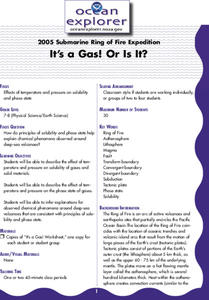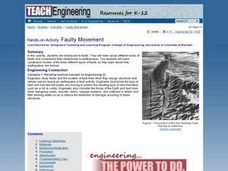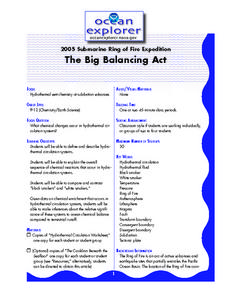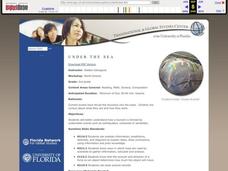Curated OER
Erosion in Different Soils [Erosion Races]
Fourth graders review how erosion can happen by wind, water, and gravity which they studied in previous lesson. They attempt to discover if all soils erode at the same rate. In small groups, 4th graders experiment with three different...
Curated OER
It's a Gas! Or is it?
Learners discover the principles of solubility and phase state and their influence on chemical phenomena observed around deep-sea volcanoes. They describe the effect of temperature and pressure on solubility of gasses and solid materials.
Cornell University
Constructing and Visualizing Topographic Profiles
Militaries throughout history have used topography information to plan strategies, yet many pupils today don't understand it. Scholars use Legos and a contour gauge to understand how to construct and visualize topographic profiles. This...
Curated OER
Faulty Movement
Students discover the faults throughout the Earth. They describe the different types of faults and how they are related to earthquakes. They build models of the faults.
Curated OER
The Big Balancing Act
Students describe chemical changes occurring in hydrothermal circulation systems. They make inferences about the significance of these systems to ocean chemical balance compared to terrestrial runoff.
Curated OER
Learning from history: can it save lives?
Students research and document lessons learned from this disaster, then compile and synthesize information. They write effectively for public education purposes and use visual communications tools
Alabama Learning Exchange
Are You Prepared?
Pupils research specific natural disasters using the Internet and a collection of books. The natural disasters include; floods, hurricanes, tornadoes, tsunamis, winter stroms, wildfires, thunderstorms, volcanoes, and earthquakes. They...
Curated OER
Under The Sea
Second graders study how a tsunami is formed by underwater events such as earthquakes, volcanoes or landslides. They discuss what they knew about living and non-living things in the ocean.
Curated OER
Buddy, Are You Ready?-Preparing for School Emergencies
Students explore natural disasters by reading stories about volcanoes, earthquakes, floods, and hurricanes. They explore safe behaviors in order to understand what to expect in a catastrophe. Students practice safe evacuation procedures...
Curated OER
Cultures of the Ring of Fire
Young scholars explore the Ring of Fire. In this Ring of Fire lesson, students research information about the Ring of Fire and plate tectonics. Young scholars write 2-page research papers regarding their findings.
Curated OER
2005 Submarine Ring of Fire Expedition: What's for Dinner?
Students compare and contrast photosynthesis and chemosynthesis as sources of primary production for biological communities, and describe sources of primary production observed in biological communities associated with volcanoes of the...
Curated OER
Constructive and Destructive forces
Students explore constructive and destructive forces. In this constructive and destructive forces lesson, students complete a WebQuest. Students explore the different types of forces and their effect on the surrounding geography. When...
Curated OER
Pass the Plate
Young scholars define constructive forces. They describe how landforms are created as a result of constructive forces. Students recognize active volcano areas in the United States. They demonstrate an understanding of Panagea.
Curated OER
The Physical Geography of Australia, Oceania, and Antarctica
Students access information from the United States Geological Survey's Web site This Dynamic Earth to research the Ring of Fire. They answer four questions and then apply what they have learned to create a bulletin board display.
Curated OER
It's a Gas! Or is it?
Students describe the effects of temperature and pressure on solubility of gases and other materials. In this investigative lesson students read an article and answer questions about it.
Curated OER
It looks Like Champagne
Students interpret phase diagrams and explain the meaning of vocabulary words. In this ocean explorer lesson students describe two uses of super-critical carbon dioxide.
Curated OER
PLATE TECTONICS WITH AN ORANGE
Students explore the concept of plate tectonics. They experiment to prove and explain plate tectonics.
Curated OER
Water 1: Water and Ice
Students explore the states of water. In this science lesson, students use observation, measurement, and communication skills to describe water as it changes from a solid to a liquid.
Curated OER
Mean Meadian and Mode
Learners apply central tendencies to given data. In this statistics instructional activity, students calculate the mean, median, and mode as it relates to their data. They collect data and graph it while identifying the way the numbers...
Curated OER
Living With the Heat: The Ring of Fire
Students investigate the planet Earth's infamous ring of fire and the life that thrives from it. In this ocean environment lesson plan, students investigate hydrothermal vents and how organisms thrive off their heat. Students...
Curated OER
Earth Egg
Students discuss plate tectonics and the layers of the earth's interior. They use eggs as models of the earth and answer questions regarding which part of the egg would represent which part of the earth.
Curated OER
A Model of the Sea-floor
Young scholars create a paper model to illustrate sea-floor spreading.
Curated OER
Weathering Rocks
Here is a geology lesson that is sure to get your charges excited. It's all about the process of weathering of rocks. Learners study natural events that can cause rocks to break apart. Some of these events are: ice wedging, plant...
Channel Islands Film
Island Rotation: Lesson Plan 1
How do scientists provide evidence to support the theories they put forth? What clues do they put together to create these theories? After watching West of the West's documentary Island Rotation class members engage in a series of...


![Erosion in Different Soils [Erosion Races] Lesson Plan Erosion in Different Soils [Erosion Races] Lesson Plan](http://content.lessonplanet.com/resources/thumbnails/140405/large/cgrmlwnvbnzlcnqymdezmdmyos01nde3lxfmmzy0dc5qcgc.jpg?1414240121)






















